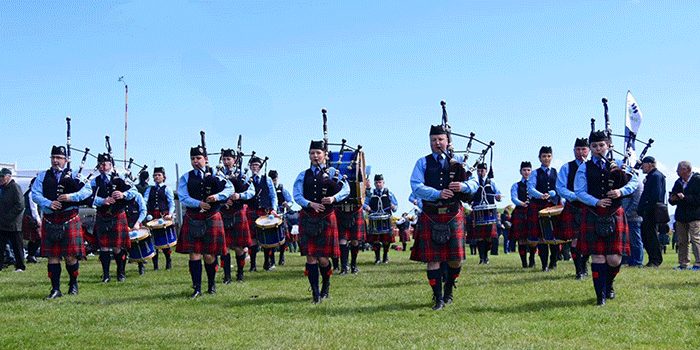
When building a Medley, pipe majors should consider time constraints. Some of the most successful bands in Grade 1 in recent years have tended to limit their Medley to just over the five minutes. (The requirement in this grade is five to seven minutes.)
These bands can still produce exciting music within the shorter time frame and have less likelihood of any slip up.

By Barry Donaldson
Introductory Tunes: These can win or lose competitions and therefore require a great deal of thought. Consider what the tune has to achieve. Your bandsmen and women are nervous and need something reasonably simple and easy whilst they are marching into the circle.
They have to concentrate on forming the circle as well as thinking about what they are playing – and it is at a stage of the performance that the pipe major has the least amount of control and is unable to conduct.
Therefore your opening tune should be long enough to facilitate formation of the circle and to allow sufficient time for players to settle before they have to think about breaking into the second piece.
Moreover, if the first tune is too short you run the risk of entering the second phase of your performance with pipers and drummers still adjusting to the environment.
The style of tune and its time signature should be considered. Hornpipe, march? Much depends on the expertise of the pipe corps.
Remember this, no matter how well you have the pipes sounding on the tuning field, a complex tune which your pipers find difficult will affect their blowing and thus compromise sound – particularly in the introductory phase.
The easier the piece the easier it is for pipers to sustain sound. There are many excellent tunes to choose from; look for something that is tried and tested and ensure your pipers can articulate the melody with ease.
Slow Airs: If your pipe corps struggles with tunes which do not have strict tempo, then avoid music which alters in rhythmic flow, or changes time signature. (This also applies to the drummers, as a less experience corps will have difficulty in providing for irregular rhythm.)
Strathspeys and Reels: Much of what I have already said about these type of tunes applies equally to the Medley discipline. Simple melodic pieces are always well received and there are plenty to choose from.
Jigs: Avoid those with lots of triplet GDE gracenote combinations. Articulating this movement, and achieving integration within a pipe corps, can be particularly difficult.
The style of jig playing has changed over the years and the modern approach is to provide a rounded triplet as opposed to a pointed one.
Indeed, nowadays all bands tend to play jigs in a rounded style. You may find that the more mature piper will have difficulty in articulating this style, whereas my experience has taught me that the opposite often applies with younger players.
Select a free flowing style of tune such as Paddy Be Easy or Minnie Hynd. Avoid the likes of Caber Feidh or the Old Wife of the Mill Dust. Both these tunes have significant triplet passages and other intricate technique.

And so we get to the end of the Medley. We’re nearly there! Don’t blow it now! These are the thoughts of every bandsperson, especially after things have gone well.
But remember, the conclusion of a performance is just as important as the start. No trailing drones, and pipers must be wary of allowing their blowing to fade producing deteriorating chanter sound.
Also a drop in concentration and creeping consternation cause a lack of unison. We have all experienced this. No matter what anybody says, the end of a Medley can be a difficult area for bands at all levels.
Ideally, the last tune should be dynamic, impressive. But this makes it all the more difficult to finish cleanly and in control. Consider the arrangement of the final few bars of your final tune. Can the melodic line conclude with a sustained low A (the easiest note for this) and with some harmonies overlaid? This will make it much easier for the pipe corps to sound well at the end.
Avoid difficult technique (in the unison sense) on the final note. The final D strike on Mrs McPherson of Inveran comes to mind in the MSR discipline. But there are similar pitfalls awaiting the pipe major who does not consider this point in his Medley construction.
- Since this article first appeared in Pipe Band Magazine the author has been appointed to the RSPBA’s Adjudicators Panel. He is also a senior judge on the solo circuit and a multiple winner of the Worlds with Strathclyde Police Pipe Band.
















The most ‘exciting’ and amazing medley I have come across was that of the Vale of Atholl Pipe Band in the 1999 World Championships – I have the CD.
Here it is (sound only) on YouTube: https://www.youtube.com/watch?v=sJdjcSKWf4Q
I love the dynamics provided by the drum corps, especially from the slow air onwards.